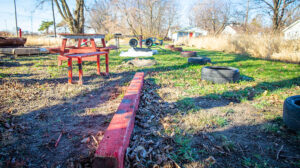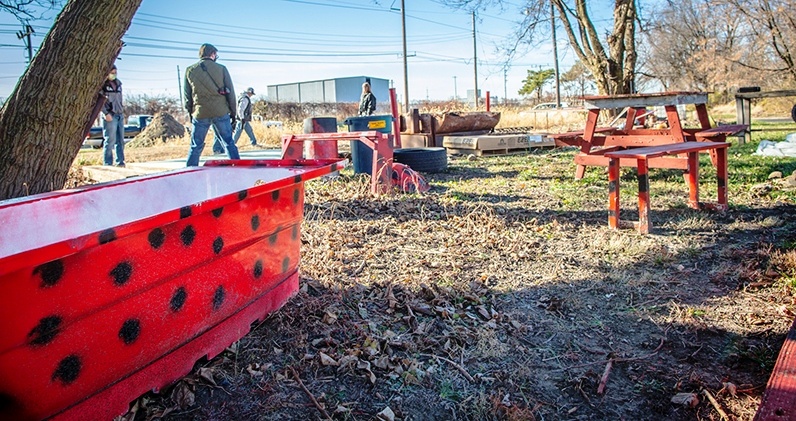An integral part of Dr. Ken Laundra‘s Environmental Sociology course at Millikin University is having students participate in a collaborative, community-based restoration project.
The purpose of the project is to have the students use the experience to better understand the academic material, which includes environmental and sociological concepts such as food insecurity, consumerism, sustainability, biodiversity, environmental justice, and deep ecology.
In Decatur, Illinois, there are over 400 vacant lots throughout the community, five of which are located in the neighborhood of Torrence Park.
 The City of Decatur leased the Torrence Park lots to revitalize them. The city’s revitalization efforts served as the initial inspiration for Dr. Laundra’s Performance Learning project starting back in fall 2019.
The City of Decatur leased the Torrence Park lots to revitalize them. The city’s revitalization efforts served as the initial inspiration for Dr. Laundra’s Performance Learning project starting back in fall 2019.
“Once the lots were identified and leased, we began to imagine the space and how best to restore it, with both the neighborhood and our course goals in mind,” said Laundra, an associate professor of sociology. “So, naturally, any plans for the lots had to be eco-friendly and sustainable, but also open and public, so that any renovations would be freely accessible to residents of Torrence Park as community property.”
The students’ first task was to inventory the lots to plan projects that would suit their course goals but also that would suit the neighborhood’s actual needs. Additionally, since the lots were all full of debris, the class took inventory of any loose, unused materials that could potentially be repurposed for various projects such as old tires, pallets, bricks, and slabs.
After a year-long assessment and planning phase, the class came up with the concept of establishing a community garden in the vacant lots.
“In past years, students worked side-by-side with Old Orchard residents, helping with the gardening and renovation of Mercy Gardens [located at the Good Samaritan Inn]. With those lessons in mind, and because community gardens provide such an amazing opportunity for environmental education for students, we found a perfect spot for our planned garden,” Laundra said.
However, Laundra and his students quickly discovered that the land was already being used by a resident as an educational gardening site for a group of children in the neighborhood. In summer 2020, Laundra and his students approached the resident about their plans and were delighted to find that the resident, and other members of the neighborhood, were more than happy to collaborate on an expanded version of the educational gardening program.
“Since a major concern had always been the lingering question of how to ‘revitalize’ an area without community engagement, it was a major relief to know that community engagement was already built-in — all we had to do was join the effort,” Laundra said.
With the help of Luke Russo, a senior environmental studies and criminal justice double major from Tinley Park, Illinois, who was granted a Summer Undergraduate Research Fellowship [SURF] from Millikin, initial renovations to the lots began in summer 2020.
“I approached Dr. Laundra about revitalizing the lot, helping the environment, and helping the community,” said Russo. “Since last fall, we’ve had close to 30 students help with the project and we were able to use funding from the SURF grant to purchase supplies.”
The project also received a $1000 grant from the Decatur Audubon Society which helped with renovations and creating more meeting space. In addition to the garden, the lot includes a concrete enclave that is being refurbished into “Mockingbird Way,” a nature trail used for exercise and education for the neighborhood kids.
Northern Mockingbirds, which reside in the bushes along the trail, made a habit of hanging around during the revitalization project in the summer which led to the name of the trail.
The garden also includes artwork and a sculpture of a large ladybug, which serves as the garden logo and mascot. Why a ladybug? Because the kids who originally occupied the space were so enamored by the numerous ladybugs in the area that they dubbed the garden “Ladybug Mountain.”
“As both an environmental studies and criminal justice major there is a lot we learn from certain things like pride and community involvement,” said Russo. “This will help the environment and help combat global warming, and it helps the city of Decatur. I hope we can use this as a blueprint for future vacant lots.”
Laundra says the class is in communication with Ameren of Illinois and Lowe‘s of Decatur to help donate and install a solar-powered irrigation system, street lighting as well as a tool shed and pavilion.
“Other community partners have contacted us as well, in an effort to support our project,” Laundra added. “Hopefully, with more donor support, we can realize our grand plan, which is to revitalize the area in Torrence Park through renovations and beautification projects beyond Ladybug Mountain, such as an additional social/gathering space, artistic and educational signage, paintings, and sculptures, street, and sidewalk art and the installation of educational kiosks in the garden and along Mockingbird Way.”
Photos courtesy of Millikin University.

